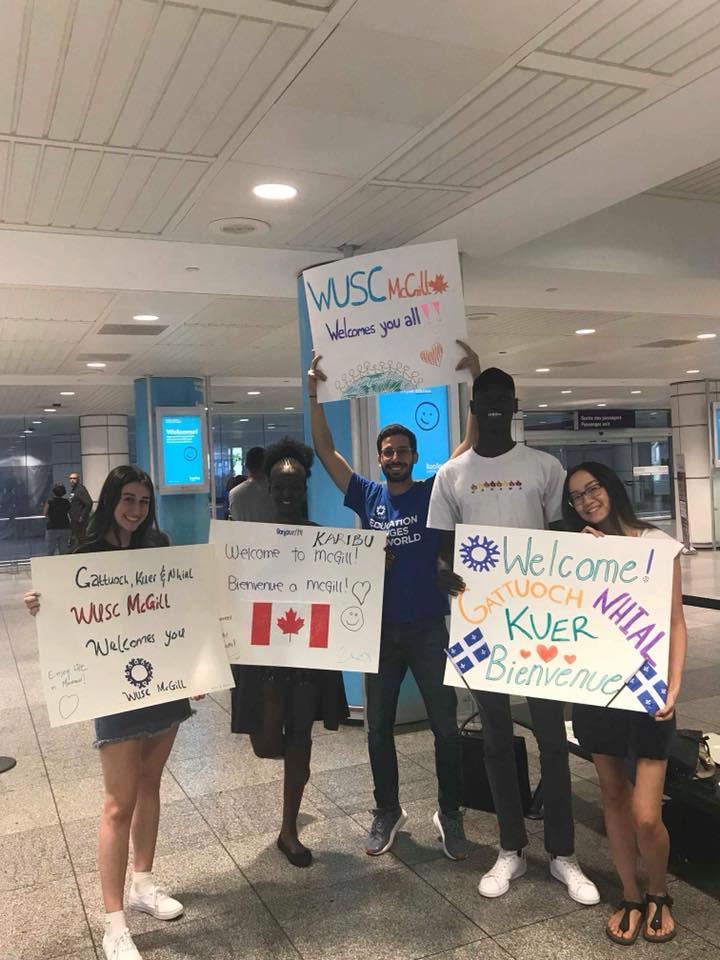In 1978, the non-profit organization World University Service of Canada (WUSC) implemented the Student Refugee Program (SRP) at Carleton University. SRP is a refugee resettlement program that focusses on financial sponsorship and integration for students hoping to study and work in the country. In the years since, the initiative has grown to support students in over 95 post-secondary institutions in Canada. As part of this program, all SRP scholars gain permanent residency status after they arrive in Canada. This is made possible through the organisation’s status as a Canadian National Sponsorship Agreement Holder with the Minister of Immigration, Refugees, and Citizenship.
The SRP was implemented at McGill in 1986 with the resettlement and integration of one student. Since its conception, the intake has increased to support three new students arriving each year. The management of SRP at each school is delegated to the campus’ Local Committee. The McGill Local Committee is made up of volunteers who ensure that SRP scholars are supported during their resettlement. Alice Ishimwe, U2 Arts and a social work intern at WUSC, explained the role of the Local Committee.
“While we are assisted by WUSC […], the United Nations High Commissioner for Refugees, the International Organization for Migration, and the Canadian government, it’s mostly the Local Committee that takes care of the ins and outs of integration for the students,” Ishimwe said in an interview with The McGill Tribune.
The student-led Local Committee prioritizes the creation of a peer support network that connects resettled students with one another. Ishimwe described the importance of student involvement in the Local Committee.
“We call it the Peer-to-Peer Sponsorship model,” Ishimwe said. The big organizations help us with interviews on the ground […] in the camps […], but when students come here they are our responsibility.”
Student-led support begins from the moment students arrive at the airport. To SRP scholars like Manyang Lual Jok, U3 Science, who arrived in Montreal in 2017, these efforts help to create a support system.
“What makes WUSC unique in terms of integration is the point that […] the first people who pick you up are schoolmates, [ which makes] it easier to interact and ask questions,” Jok said. “For all of us, the first point of contact is always the Local Committee [….] They can go on to become your mentors.”
The SRP program currently relocates students from Jordan, Kenya, Lebanon, Malawi, Tanzania, and Uganda to Canada and sponsors the students’ expenses for one year, after which they can apply for federal student loans. In the six countries where the SRP operates, there are government-mandated restrictions on higher education. Jeanne-Armelle Uwilingiyimana, U3 Agriculture and Environmental Sciences, explained the necessity of a program like SRP in aiding her relocation to Montreal from Malawi in 2017.
“The whole experience was a life-changing opportunity [….] In my cohort, 250 people applied and 22 were selected,” Uwilingiyimana said in an interview with the Tribune. “It is very sought-after [….] When you graduate high school, you could apply to university but […] the government does not fund refugees or non-Malawians to go to university [….] I don’t see how my future would have been beyond WUSC.”
WUSC McGill recognizes that limited quotas on students admitted through SRP to Canadian universities can leave behind many deserving students during the selection process. Ishimwe explained that in an effort to address this constraint, the upcoming Students’ Society of McGill University (SSMU) referendum will include a question that asks for an increase in the fees that students pay to support the program.
“[Currently], each student at McGill [is] paying $2 per semester to help us sustain the program,” Ishimwe said. “We are going to see if we can increase that due to the high number of refugees across the world, especially because of COVID-19.”
The organization hopes to increase the student fee from $2 to $4 through the referendum. 2018 SRP scholar Gattuoch Kuon, U2 Science, explained the significance of this proposed change.
“To do good for the world […], don’t see it as four bucks,” Kuon said. See it as four people and their families. You are changing lives.”








